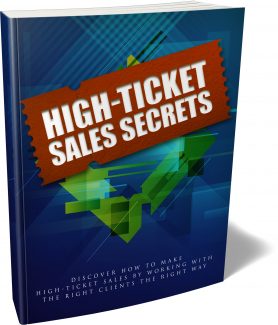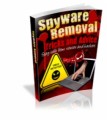 License Type: Master Resell Rights
License Type: Master Resell Rights  File Type: ZIP
File Type: ZIP
 SKU: 62699
SKU: 62699  Shipping: Online Download
Shipping: Online Download
Sample Content Preview
If you want to sell anything online, it’s actually not all that hard. I know that this is kind of a surprise to a lot of people. Some affiliate marketers who have been struggling would swear up and down that making sales online is nearly impossible.
Well, with the right traffic and the right sales materials, you are bound to generate sales from time to time. Closing a sale is not the problem. Generating consistent, high-value sales, that's the issue. Don't confuse the two.
Sadly, even if you are able to master the art of online sales, you may still continue to struggle. I understand that this is better than not generating any sales at all, but if you put in a lot of time, effort, and energy into generating online sales only to settle for a low middling mount, you're wasting your time. That’s the bottom line. As the old saying goes, “Either you go big or you go home.”
The name of the game when it comes to online sales success is return on effort. You heard that right. You’ve probably heard of the phrase “return on investment” millions of times before. Return on effort works on the same principle, but there is a slight difference.
With return on investment, you are trying to invest as little money as possible while getting as much return as you can. Pretty straightforward, very simple concept.
Similarly, if you're going to invest your time, attention, and focus in something, shouldn't you expect maximum rewards as well? This is the whole concept behind return on effort.
If you work for yourself, it's very easy to work around the clock for chump change. Believe me, I’ve done it. It's not pretty. Sure, you’re passionate about what you do. Oftentimes, it doesn't even feel like you're working. However, let me tell you, if you're going to invest your time, effort, and precious energy into something, don't you deserve to get the biggest reward out of all that investment?
Thankfully, there is a way out. You don't have to stick to the grind. You don't have to put in all these hours away from your loved ones just so you can put food on the table.
Using the high ticket sales secrets that I’m going to share with you in this book, you will learn how to maximize the return that you get for all your efforts. It is not rocket science. It all boils down to being at the right place, talking about the right things at the right time with the right people.
If you're able to line all those up, then you will get all the best results. At first, it may seem like this is very hard to set up. You only need to look at how high ticket sales people do it. When they started off, they were no better than you. In fact, in many cases, they knew less than you. Now, here they are, generating seven or even eightfigure annual sales. How do they do it? It all boils down to high ticket sales.
Make Sure You're in the Right Niche
Any discussion of high-ticket sales marketing must first begin with niche selection. Get this wrong and you are going to waste your time, effort and money.
This is non-negotiable. If you make a mistake with the niche that you pick to build your business on, you're going to fail. The truth is, not all niches pay the same.
Niches are essentially subject matter categories involving your target audience’s problems, needs, or interests. These are different subjects and they attract different audiences. Some audiences are willing to pay a lot of money. Other audiences are not as willing.
Even within the high paying audiences, there is a question of timing. There are certain products and service categories that compel people to spend a lot of money right away.
Unfortunately, these are relatively few. These are comparatively few when you line them up with all the other niches out there.
Ideally, this is where you should be. You should look for niches that pay really well, and people need to order merchandise or services almost immediately.
The Reality: Most Niches Pay Poorly
There, I said it. Most niches don't pay all that well.
Well, this might rub you the wrong way. You might tell me that when you check Google's Keyword Planner tool, you notice that a lot of niches that you're interested in actually command fairly high PPC (Pay Per Click) figures.
My answer is, "Look closer."
If you pay attention to those figures, it turns out that, in many cases, for people to click on an ad that pays that much, they must be really, really interested already. In other words, they have been prequalified and they are ready to buy.
That's usually not the case. Usually, people are interested in a wide range of topics, but they're not ready to buy.
They're ready to do a lot of research, they don't have a problem with comparing different sources of information, but when it comes to buying, they're not quite there.
This is why I can say, with utmost confidence, that most niches pay poorly when you look at immediacy.
It's not enough that people may pay good money for a particular range of merchandise or a particular type of service. That's not the issue.
The issue is how willing they are to pay.
Don't Build Your House on Sand
To make matters worse, the best niches (high pay, high demand) tend to get saturated very quickly. It's easy to see why.
You need to build your business on a solid foundation.
This means that your target niche must be lucrative enough and must have a high sense of buyer urgency. Otherwise, you are building your house on sand. You can build tons of these and end up making very little money.
Unless you want to play the volume game, where you are cranking out hundreds of websites, and each of these websites make, at best, a couple of dollars a day, you're going to have to be more careful about niche selection.
You have to be systematic and methodical regarding the type of business you build and the platform you choose to convert your traffic. You also have to be systematic about getting the right kind of traffic and qualifying it so it is more likely to convert. All of this boils down to selecting the right niche.
You Must Target the Right Client
In any kind of market, there will always be audience segmentation.
It's easy to think that just because you are targeting insurance as a niche, you can automatically assume you will make a lot of money.
On the surface, this seems very reasonable. After all, when you go to Google Keyword Planner tool and load up all sorts of insurance-related keywords, you get really high figures.
It's not uncommon for an insurance-related term to pay $30 or more per click. What's not to love? But here's the problem. That market has many segments.
Not everybody who looks for insurance online is ready to buy. Not everybody who is interested in buying an insurance policy is willing to pay top dollar.
In fact, in many cases, a lot of people looking for insurance would rather pay the least amount of money or take out the cheapest type of policy possible. Welcome to the world of market segmentation.
Audiences, in what seem like lucrative niches, have different needs. They tend to segment themselves.
There are people who are willing to pay top dollar immediately. There are people who are willing to pay top dollar later on. There are people who are not willing to pay market rates and are always looking for a bargain, but they are willing to buy now. Finally, there are people who are very cheap and are willing to wait.
Which of these audience members would it make sense for you to chase? This is not rocket science. It should be quite obvious.
Always Be Aware of the Differences Between Your Target Customers
Just because people are interested in the high value niche you are targeting, it doesn't mean that all your visitors will convert. If this is your assumption, I would not be surprised if you continue to struggle.
You're setting yourself up for a disappointment. You have to be aware of the differences between your audience members.
- License: Master Resell Rights
- Category:Ebooks
- Tags:2019 Ebooks Master Resale Rights








